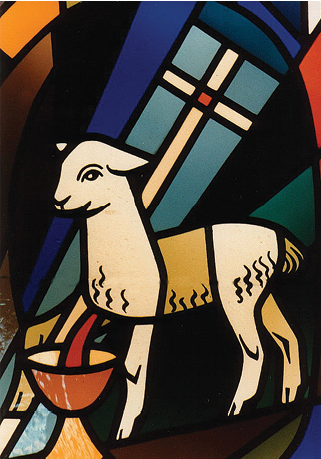Ever wonder why we Lutherans use the form of worship we do? In this series we examine the depth and meaning of the various elements of our Lutheran worship service.
O Christ, Thou Lamb of God, that takest away the sin of the world, have mercy upon us.
O Christ, Thou Lamb of God, that takest away the sin of the world, have mercy upon us.
O Christ, Thou Lamb of God, that takest away the sin of the world, grant us Thy peace. Amen.

When John the Baptist identified Jesus as the promised Christ, he called Him “the Lamb of God,” (John 1:29) for this was how God had depicted the Christ in prophecy. He was to be sacrificed as the Passover lamb was sacrificed. His blood was to be an offering to save sinners from God’s wrath, as the blood of the Passover lamb saved the Israelites from the plague of death. The portrayal of the Christ as a sacrificial lamb appears also in Isaiah 53, where His passion and death are foretold as a lamb being led to the slaughter.
And it isn’t only in prophecy that Christ is call “the Lamb.” The apostle Peter—looking back at Christ’s completed work of atonement—says that we were redeemed “with the precious blood of Christ, as of a lamb without blemish and without spot.” (1 Peter 1:19) And in the visions granted to John in the Book of Revelation, the victorious Christ appears as the Lamb that was slain but now lives and is praised for His work of redemption (Revelation 5:6).
The figure of Christ as a lamb is used extensively in Christian art and hymns, because it brings to mind the Savior and His sacrifice for us. It calls us to remember the great price our Lord paid for our redemption and stirs us up to respond with praise and devotion.
Also in our Communion liturgy we sing the Agnus Dei (Latin for “Lamb of God”) in which we address Christ, using the words of John the Baptist, as the Lamb of God that takes away the sin of the world. It is an ancient practice dating back to the beginning of the eighth century.
In the traditional form of the Agnus Dei that we have in The Lutheran Hymnal (page 28) we offer three prayers to the Lord Jesus, addressing Him as the living and reigning Christ Who is able to hear and grant our petitions. Twice we address Him as the merciful Savior, our brother Who took our human nature and lived as a man in this sinful world, Who knows our trials and sorrows. In the last of the three prayers, we ask Jesus for peace; and not just peace, but His peace. This is the peace that He promised His disciples on the night in which He was betrayed, saying, “Peace I leave with you, My peace I give to you; not as the world gives do I give to you. Let not your heart be troubled, neither let it be afraid.” (John 14:27)
In the Lord’s Supper Jesus gives us what we pray for in the Agnus Dei: He has mercy on us and grants us His peace by giving us His own body and blood together with the bread and wine, assuring us that the sacrifice He offered as the Lamb of God was for each of us individually and personally. Knowing that, we can lead lives that are characterized by inner peace, what Paul calls “the peace of God which surpasses all understanding.” (Philippians 4:7) Troubles still dog us in this world, but in the Lord’s Supper we are assured that all is right between us and God. And since that is so, we know that God will help us through our troubles and guide us safely to eternal life.
is a retired pastor. He lives in Watertown, South Dakota.


